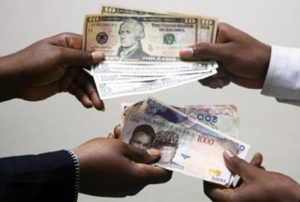 The Nigerian naira exhibited signs of resilience against the United States dollar, gaining ground by N125 to reach an exchange rate of N1,275/$1 over the weekend, marking a notable 9.8% increase from the previous rate of N1,400/$1 at the close of trading on Friday.
The Nigerian naira exhibited signs of resilience against the United States dollar, gaining ground by N125 to reach an exchange rate of N1,275/$1 over the weekend, marking a notable 9.8% increase from the previous rate of N1,400/$1 at the close of trading on Friday.
The Senate, through its Committee on Finance, has called for a collaborative effort among relevant stakeholders to restore and sustain the stability of the naira, highlighting the urgent need to address the currency’s instability and continuous depreciation.
Currency traders at the renowned Wuse Zone 4 market attribute the exchange rate fluctuations to trading uncertainties in the market. They emphasize that the government must decide whether to increase the value of the naira or opt for devaluation to bring about market stability.
However, due to the absence of trading activity on Sunday, currency traders did not provide a selling rate. Traders, such as Malam Yahu Ibrahim, express concerns about the risks associated with trading the unstable naira, urging the government to take decisive measures to either reduce the value of the dollar or stabilize the naira. They emphasize the negative impact of fluctuating exchange rates on businesses.
Echoing those sentiments, another trader, Abubakar Taura, expresses caution in predicting Monday’s exchange rate due to the market’s volatile nature and ongoing concerns that the Central Bank of Nigeria (CBN) might implement drastic measures to stabilize the naira.
Coinciding with the naira’s recovery, the Association of Bureaux De Change Operators of Nigeria (ABCON) plans to unify the retail end of the foreign currency market, a move aimed at curbing volatility and enhancing regulatory compliance within that segment.
Prior to the marginal gain, the naira had experienced a 26.2% loss within two weeks, compared to the exchange rate of N1,125/$1 on April 12, 2023, in the parallel market.
In an effort to enhance liquidity in the unofficial market, the Central Bank of Nigeria approved the allocation of $15.83 million to 1,583 BDC operators last Monday.
However, at the official foreign exchange window, the naira continued its downward trajectory against the U.S. dollar, closing at N1,339/$1 on Friday, marking a 2.24% depreciation from the N1,309/$1 rate quoted on Thursday. This indicates a full week of depreciation at the official market.
Trading between willing buyers and sellers at the Nigerian Autonomous Foreign Exchange Market reached a total volume of $1 billion.
Concerned about the recent depreciation of the naira in the forex market, the Senate, through its Committee on Finance, has emphasized the necessity for concerted efforts by all relevant stakeholders to rescue and maintain the stability of the currency.
Senator Sani Musa, the Chairman of the Committee, expressed the urgency to address the root causes of naira depreciation, including fluctuations in global oil prices, fiscal deficits, and structural imbalances in the economy. The committee is actively monitoring the situation and exploring various policy options to mitigate the impact of naira depreciation and foster economic stability.
Senator Musa urged Nigerians to remain vigilant and resilient during these uncertain times, emphasizing the importance of collaboration and adherence to established norms and standards to achieve economic growth and prosperity for the country.

